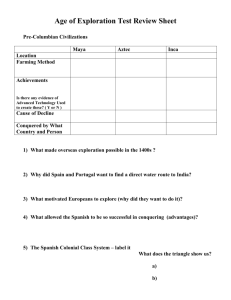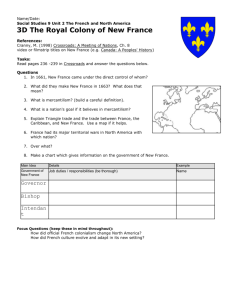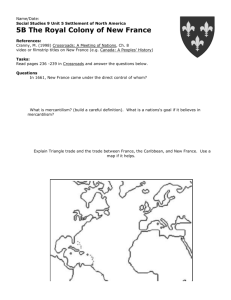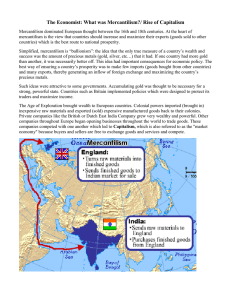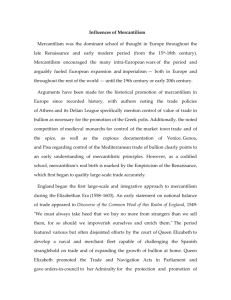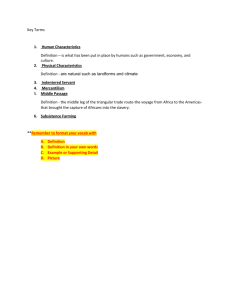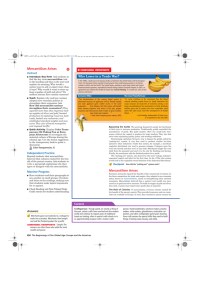The Early History The Middle Ages and the Scholastics
advertisement
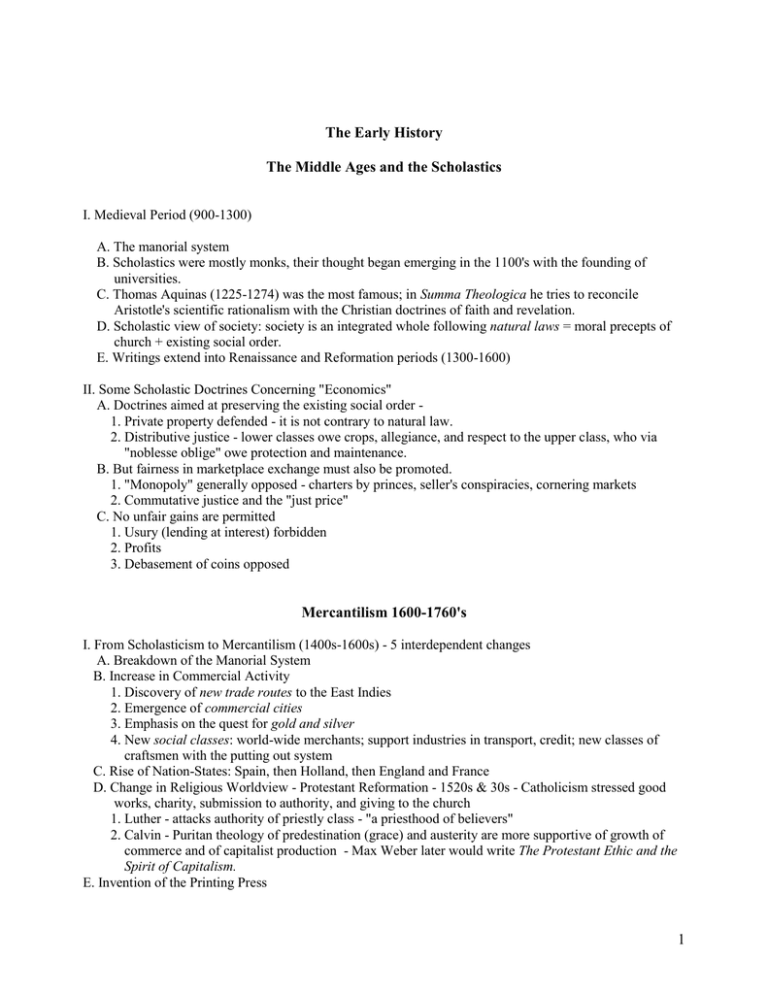
The Early History The Middle Ages and the Scholastics I. Medieval Period (900-1300) A. The manorial system B. Scholastics were mostly monks, their thought began emerging in the 1100's with the founding of universities. C. Thomas Aquinas (1225-1274) was the most famous; in Summa Theologica he tries to reconcile Aristotle's scientific rationalism with the Christian doctrines of faith and revelation. D. Scholastic view of society: society is an integrated whole following natural laws = moral precepts of church + existing social order. E. Writings extend into Renaissance and Reformation periods (1300-1600) II. Some Scholastic Doctrines Concerning "Economics" A. Doctrines aimed at preserving the existing social order 1. Private property defended - it is not contrary to natural law. 2. Distributive justice - lower classes owe crops, allegiance, and respect to the upper class, who via "noblesse oblige" owe protection and maintenance. B. But fairness in marketplace exchange must also be promoted. 1. "Monopoly" generally opposed - charters by princes, seller's conspiracies, cornering markets 2. Commutative justice and the "just price" C. No unfair gains are permitted 1. Usury (lending at interest) forbidden 2. Profits 3. Debasement of coins opposed Mercantilism 1600-1760's I. From Scholasticism to Mercantilism (1400s-1600s) - 5 interdependent changes A. Breakdown of the Manorial System B. Increase in Commercial Activity 1. Discovery of new trade routes to the East Indies 2. Emergence of commercial cities 3. Emphasis on the quest for gold and silver 4. New social classes: world-wide merchants; support industries in transport, credit; new classes of craftsmen with the putting out system C. Rise of Nation-States: Spain, then Holland, then England and France D. Change in Religious Worldview - Protestant Reformation - 1520s & 30s - Catholicism stressed good works, charity, submission to authority, and giving to the church 1. Luther - attacks authority of priestly class - "a priesthood of believers" 2. Calvin - Puritan theology of predestination (grace) and austerity are more supportive of growth of commerce and of capitalist production - Max Weber later would write The Protestant Ethic and the Spirit of Capitalism. E. Invention of the Printing Press 1 II. Mercantilism - Overview A. Was both a set of ideas and an exercise in statecraft - the term "mercantile system" was coined by Later writers like Adam Smith and the Marquis de Mirabeau, who were critical of it. B. There was no organized school, just a loose set of writings - a policy-oriented, pre-analytic tradition. C. All policy was justified by saying that it would increase the power of the nation D. The major policy goal was to increase the total amount of specie (bullion; gold and silver) flowing into a country. This was based on the false belief that Wealth = Bullion. E. Developed differently in different countries, our emphasis will be on France and England. III. French Mercantilism A. Few writings. Rather, was a policy undertaken by members of the Royal bureaucracy to strengthen the Crown and nation. Some projects were begun under the Duke de Sully and Barthélemy de Laffemas during the reign of Henry IV (1589-1610), including tax reform, public works, and subsidies to French manufacture. B. But Henry was assassinated in 1610 and the power of monarchy faded for nearly 50 years, until it was re-established under Louis XIV (1661-1715). 1. Builds Versailles 2. Encourages cultural affairs 3. Ends religious problems with the Hugenots (French Protestants) 4. Fought 5 wars for territory C. Jean Baptiste Colbert is Controller General of Finance 1665-83; French mercantilism is often called Colbertism. IV. English Mercantilism A. English political history is quite different from the French. Briefly: 1. Queen Elizabeth (1558-1603) avoids defeat by Philip's Spanish Armada; mercantilist policies build up English trade and shipbuilding. 2. James I (1603-25) alienates Puritans and declares the Divine Right of Kings to rule. 3. Charles I (1625-49) dissolves Parliament in 1630; civil war leads to his execution in 1649 4. Protectorate under Cromwell, two more kings, then the Glorious Revolution of 1688-89 places William and Mary on the throne and the English Bill of Rights signed. Results: The power of Parliament was established, and revolution gotten out of the English blood. This contrasts with France, where the power of absolute monarchy was established, and revolution would await until 1789. These differences also explain what economic doctrines will emerge next, namely Classical Liberalism in England versus Physiocracy in France. B. Most writings were tracts and pamphlets by merchants - they argued that certain policies (that favored their interests) would strengthen the nation and should therefore be adopted. Will look at the three M’s – Malynes, Misselden, and Mun 1. Gerard de Malynes (1586-1641) 2. The crisis of 1620 3. Edward Misselden (1608-1654) 4. Thomas Mun (1571-1641) V. Assessment of Mercantilism A. Their basic analytic error - Wealth is not equal to Bullion 1. David Hume shows the error of the policy analytically with his description of a "Reverse Species Flow Mechanism 2 2. Experience of Spain provides crude confirmation empirically that the mercantilists were wrong. State intervention can be successful in promoting certain industries - Elizabeth's policies may have saved England from Spain. C. But Mercantilists never realized that there are gains from trade – they saw trade as a zero sum game. D.Note some English-French differences 1. English - the trade model - merchants emphasize restrictions that would help them compete against foreign business 2. French - the internal development model - subsidize certain domestic industries so they can successfully compete in world markets B. VI. Some Closing Considerations The Rise of Science and Scientific Method in the 17th Century A. Some Significant Dates 1600 - Gilbert's studies in magnetism 1609-10 - Kepler's 3 laws - planets travel in elliptical orbits, not circles 1610 - Galileo's telescope reveals craters on the moon 1620 - Francis Bacon (1561-1626) in Great Instauration outlines the inductive method 1628 - Harvey discovers the circulation of the blood 1637 - René Descartes (1596-1650) in Discourse on Method outlines the deductive method 1660 - Royal Society (of science) founded in England 1666 - Academie Royale des Sciences founded in France 1687 - Sir Isaac Newton (1642-1727) in Principia Mathematica uses the law of gravitation to construct Newtonian system of celestial mechanics B. Scientific Philosophy - 2 "competing" methods for gaining knowledge 1. Francis Bacon (1561-1626) and the inductive method 2. René Descartes (1596-1650) and the deductive method C. Sir Isaac Newton (1624-1727) synthesizes the two in his work. 3
